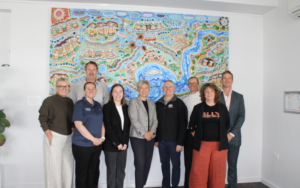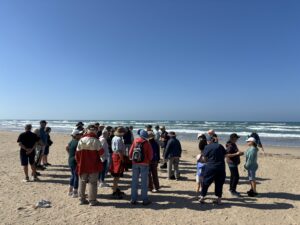60 Seconds with Dr Carmel Pollino
Carmel Pollino is Research Director for Water Security at CSIRO. After several years as a member of the Goyder Institute for Water Research Management Board, Carmel is leaving the Board, with Dr Chris Chilcott, Deputy Director, Environment at CSIRO stepping in as Carmel’s replacement. We are very sorry to see Carmel leave, and we thank her for her considerable contributions and strategic guidance to the Goyder Institute over her term as Board member. We warmly welcome Chris into the role and look forward to working together moving forwards.
Carmel provided some insights into why water is important to her and how her role can help to provide solutions to complex water challenges.
What first sparked your interest in the environment and water?
I was a naturally curious kid, and I grew up in Melbourne near a creek that had poor water quality and a river that flooded. I cared about what was happening to our environment.
What do you think are the biggest challenges facing water security across Australia and within South Australia in particular?
Climate and Weather. The 2024 recent State of the Environment report points to changes over the last decade. The intensification of the hydrological cycle is really going to test our understanding of our water systems, how we predict and how we adapt. Science plays a critical role, and I know the work we are doing is so critical to rapidly adapting to a changing climate, whilst ensuring equity for all people and the environment.
What do you think we can learn from other countries regarding water research/management?
Australia is at the forefront of water science, and I am proud to be a scientist in Australia. But, we have lots to learn – and one of our biggest challenges is truth telling with Indigenous people and working together in how we understand and adapt to change in our water systems.
How do you think digital science solutions can impact water research in South Australia?
The Digital Transformation is happening now! Earth Observation, big data and Artificial Intelligence can revolutionise how we measure and predict water and environmental systems, and their complex interactions. Generative AI can rapidly synthesise knowledge and communicate new findings. We need to be in the forefront of using this new source of intelligence ethically and responsibly. Digital science is going to rapidly influence how we work and in handling complexity – it is an exciting time.
What is your favourite part of your role at CSIRO?
I am passionate about water, the environment and science. Being able to lead the Water Security Program, which makes a real difference in policy and management motivates me. I have the best team to work with in achieving this impact.
What are the benefits of working with Academic Researchers?
Science is for curious explorers of knowledge – and working with university researchers allows us to explore a range of science areas, bringing a range of expertise and fresh minds to a problem.
What is your proudest water-related achievement from your career?
I think I am living that now – I am proud to be a Research Director for Water Security in CSIRO, delivering science to solve the biggest challenges in water and the environment, for today and for the future.



